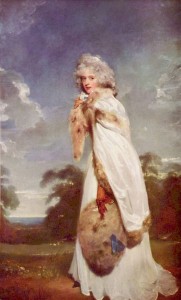All links are to Wikipedia entries.
Government, Politics, and War:
- February 20: Holy Roman Emperor Joseph II dies and is succeeded by his brother, Leopold II.
- March 14: William Bligh arrives back in Britain with the first report of the mutiny on the Bounty.
- April 17: Benjamin Franklin, American scientist and statesman, dies at age 84.
- July: Louis XVI of France accepts a constitutional monarchy.
- July 4: Britain allies with the Nizam of Hyderabad against the Mysore.
Literature, Journalism, and Publishing:
- William Blake publishes The Marriage of Heaven and Hell.
- Scottish poet Joanna Baillie publishes Fugitive Verses.
- Mrs. Ann Radcliffe publishes A Sicilian Romance.
- November: Edmund Burke publishes Reflections on the Revolution of France, which condemns the revolution as the beginning of mob rule.
- November: Vindication of the Rights of Men, a pamphlet by Mary Wollstonecraft is the first published response to Burke‘s Reflections on the Revolution in France.

Portrait of Elizabeth Farren by Thomas Lawrence, 1790. (Click on image to see a larger version and read to more about it.)
Art, Architecture, and Design:
- Thomas Lawrence exhibits for the first time at the Royal Academy, with portraits of Queen Charlotte and the actress Elizabeth Farren (later Countess of Derby).
- Joseph Mallord William Turner is accepted into the Royal Academy at age 15.
- George Stubbs paints Lion Attacking a Horse. Its co-mingling of the horrific and the sublime, its exaltation of nature and the emotions, mark it as a forerunner of the Romantic movement.
- James Wyatt erects a cast iron footbridge at Syon Park, Isleworth, the first known British example.
- April: Josiah Wedgwood reveals his first reproductions of the Portland Vase, in jasperware.
Music:
- Joseph Haydn completes String Quartets, Op. 64.
- January 26: Mozart‘s opera “Cosi Fan Tutte” premiers in Vienna.
- October 9: Mozart’s Concerto for Pianoforte and Orchestra in D major (Coronation) is performed for the first time at the coronation of Leopold II in Frankfurt-am-Main.
Science and Industry:
- January 1: The 91-mile Oxford Canal is opened throughout, providing an important link between the River Thames at Oxford and Coventry in the English Midlands.
- January 30: The first boat specialized as a life-boat, Henry Greathead‘s Original, is tested on the River Tyne.
- June 28: The Forth and Clyde Canal is opened.




